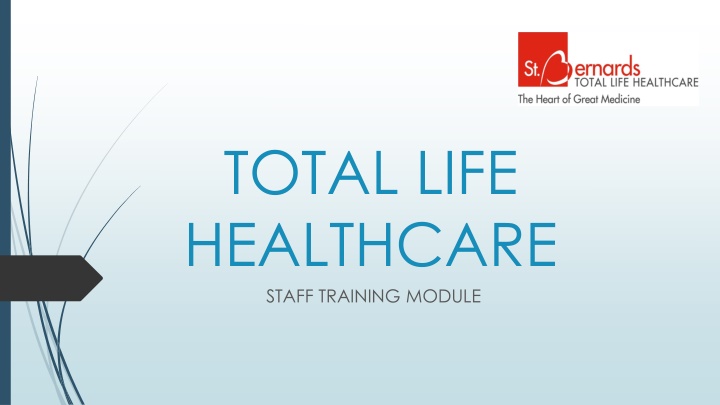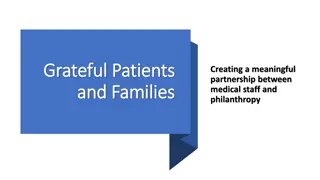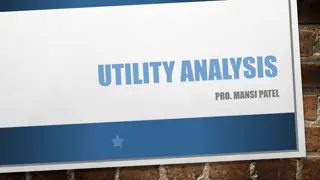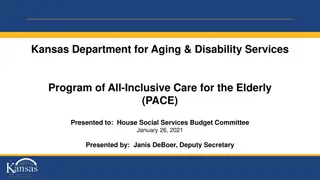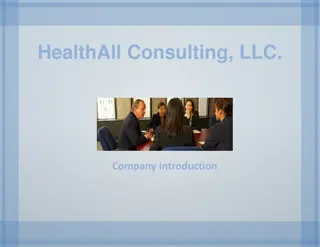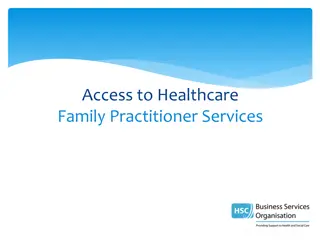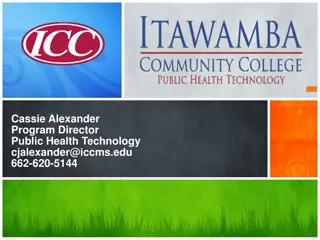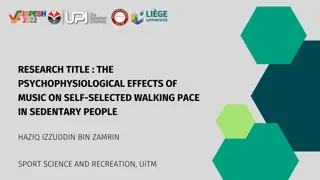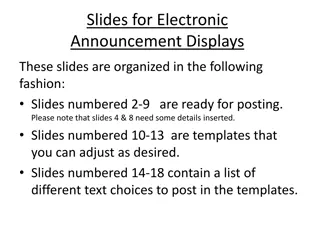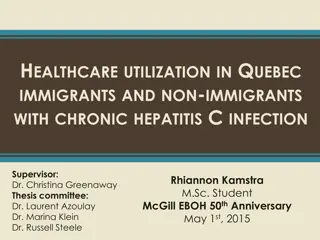Total Life Healthcare - PACE Program and Services Overview
Total Life Healthcare provides an innovative Program of All-Inclusive Care for the Elderly (PACE) designed to help seniors stay independent and receive comprehensive healthcare services. Established in 2005, Total Life Healthcare offers PACE programs in rural areas to support individuals eligible for nursing home care, enabling them to live in their community with dignity and independence. Eligible participants must meet specific requirements and reside within designated zip codes served by Total Life Healthcare.
Download Presentation

Please find below an Image/Link to download the presentation.
The content on the website is provided AS IS for your information and personal use only. It may not be sold, licensed, or shared on other websites without obtaining consent from the author.If you encounter any issues during the download, it is possible that the publisher has removed the file from their server.
You are allowed to download the files provided on this website for personal or commercial use, subject to the condition that they are used lawfully. All files are the property of their respective owners.
The content on the website is provided AS IS for your information and personal use only. It may not be sold, licensed, or shared on other websites without obtaining consent from the author.
E N D
Presentation Transcript
TOTAL LIFE HEALTHCARE STAFF TRAINING MODULE
TOTAL LIFE HEALTHCARE MISSION VISION To help seniors stay independent To enable the frail elderly to live in their community with dignity and independence
PACE PROGRAMS Program of All-Inclusive Care for the Elderly (PACE) Total Life Healthcare is a PACE program, which offers individuals eligible for nursing home care the option of continuing to live in the community Coordinates and provides a comprehensive system of care that encompasses preventive, primary, acute, and long term care Services are focused on health and well-being of the individual PACE began in 1973 in San Francisco to help the Asian-American community care for the elderly, as placing them in nursing homes was not a culturally acceptable solution. Created an innovative way to offer medical supervision, physical and occupational therapy, nutrition, transportation, respite care, socialization, and other services using home care and an adult day care setting.
TOTAL LIFE HEALTHCARE In 2005, grants were awarded to 14 sites to start PACE programs in rural areas. Total Life Healthcare became one of the first rural PACE sites in America. TLH enrolled the first participant in August 2008. TLH was the only PACE program in the state of Arkansas from 2008-2016. Complete Health with PACE opened in Little Rock in July 2016, becoming the second site in the state. PACE of the Ozarks in Northwest Arkansas opened in February 2019. Currently there are 137 PACE providers in 31 states.
ELIGIBILITY REQUIREMENTS Participants must meet the following requirements to be eligible for PACE: Be 55 years or older Live within the PACE Organization Service Area Certified by the State of Arkansas (DHS) as being in need of nursing home level of care Able to live safely in the community with PACE support upon enrollment Eligible for Medicare and Medicaid or Medicaid only
Zip Codes served by TLH: Craighead: all zip codes Greene: Paragould 72450 Poinsett: Harrisburg 72432 Lepanto 72354 Marked Tree 72365 Trumann 72472 Randolph: Pocahontas 72455 Lawrence: Hoxie 72433 Sedgwick 72465 Walnut Ridge 72476 Mississippi: Blytheville 72315 Gosnell 72319 Manila 72442 Leachville 72438 Cross: Cherry Valley 72324 Parkin 72372 Wynne 72396 Vanndale 72382
INTERDISCIPLINARY TEAM PACE utilizes Interdisciplinary Teams to exchange information and solve problems as the conditions and needs of each participant change. Personal Care Aide Representative Physical Therapist Occupational Therapist Dietitian Home Care Coordinator Primary Care Physician Registered Nurse Social Worker Activity Coordinator Center Manager Transportation Representative
PARTICIPANT RIGHTS Respect and nondiscrimination, treated with dignity and respect Confidentiality of health information Free from harm, including abuse and neglect Receive accurate and easily understood information Female participants may choose specialist in women s healthcare services Participate in all treatment-related decisions or designate a representative Access to emergency services Voice grievances with TLH and contracted service providers May disenroll from the program at any time
SERVICES PROVIDED Primary Care Dental, Hearing, and Vision Services Social Services and Counseling Physician and Nursing Services Hospital and Medical Specialty Services Medical Transportation Prescription and OTC Medications Recreational Therapy Emergency Services Respite Care Home Health and Personal Care Nursing Home Care Adult Day Care (DayPlace) Caregiver Education and Support ClubPACE Senior Center Physical, Occupational, and/or Speech Therapy Nutritional Counseling Medical Equipment and Supplies Meal Delivery **TLH can provide any service deemed necessary by the Interdisciplinary Team to improve and maintain the participant s overall health status**
CLUBPACE & DAYPLACE ClubPACE DayPlace TLH Senior Center Open 8am 4:30pm Attendance amount varies Lunch meal served Activities Therapy Services Clinic Appointments Supplies Staffed primarily by CNAs Provides socialization Adult Day Health Care Open 7:30am 5:30pm Primarily for dementia patients or those needing additional assistance with personal care or transfers 5:1 staffing ratio (LPN/RN and CNAs) Open to the public (pay per hour) LPN/RN may give medications or perform treatments Provides respite for caregivers Lunch meal served, am and pm snacks
FINANCIAL COMPONENT TLH becomes the participant s primary insurance provider. TLH receives a monthly capitated payment for each participant. The PACE model combines payments from Medicare and Medicaid into one flat-rate payment to provide the entire range of health care and services in response to individual needs. Participants do not pay any out-of-pocket expenses for medical care if the services are approved and in-network. PACE provides all care and services covered by Medicare and Medicaid, as well as additional medically necessary care and services as authorized by the interdisciplinary team.
BENEFITS OF PACE PACE provides participants regular access to doctors and other primary care professionals who know them and who specialize in caring for seniors. Participants can disenroll from PACE at any time for any reason. Participants are encouraged to voice grievances and have the right to appeal any treatment decision made by the IDT. An RN is on-call 24 hours/day for urgent issues that arise after hours. PACE statistics: Average age of PACE participant is 77 70% of PACE participants are female, 30% are male Most common diagnoses include: vascular disease, diabetes, CHF, COPD, and depression 47% of PACE participants have a diagnosis of dementia 100% of PACE participants need nursing home level of care, but only 5% live in one
THE AGING PROCESS Thinning skin easily bruised, high risk for skin tears Brittle bones increased risk for fractures Loss of muscle mass decreased strength, balance and coordination Heat and cold intolerance Numerous chronic medical conditions diabetes, heart/lung/kidney diseases More prone to infection, including urinary tract and respiratory infections Bladder and bowel incontinence GI issues: tooth problems, difficulty swallowing, constipation Vision and hearing changes Loss of appetite Decreased touch sensation due to diabetes and circulatory issues Sleep pattern alterations
ELDER ABUSE Neglect or Self-Neglect Lack of basic hygiene, adequate food, or clean, appropriate clothing Lack of medical aids or devices Dementia patient left unsupervised Bedbound patient left without care Home cluttered, filthy, in disrepair, having fire and safety hazards Home with adequate facilities (stove, heating and cooling, electricity) Untreated pressure sores Psychological/Emotional Abuse Unexplained or uncharacteristic changes in behavior Caregiver isolates victim from others Victim humiliated, harassed, or threatened with punishment or deprivation Caregiver verbally aggressive, demeaning, controlling, concerned about spending money on the victim s care Physical or Sexual Abuse Inadequately explained fractures, bruises, welts, cuts, sores, or burns Use of restrains that intends to limit the victim s total mobility as a punishment Unexplained sexually transmitted diseases Financial Abuse/Exploitation Lack of amenities victim could afford Caregiver controls victim s money but does not provide for their needs Giving excessive financial reimbursement for care and companionship
WORKING TOGETHER TLH works to maintaining close working relationship with contracted providers Share participant needs and concerns with each other Communicate changes in caregiver/living situation Recognize safety issues (danger, unsafe to live alone, family dynamics) Shared Goals of Participant Care Keeping participants healthy and independent Managing chronic health conditions in the home environment Preventing complications of aging and/or existing chronic illnesses Delaying functional decline by reinforcing healthy behaviors Achieving the highest possible quality of life
REPORTING GUIDELINES Any signs or suspicions of elder abuse Falls (with or without injury) Burns (hot food or liquids, hair appliances, severe sunburn) Changes in mental status or behavior Any skin changes (redness, rash, open wounds) Urinary symptoms (burning, frequency, strong urine odor, pain) Difficulty breathing, chest pain, or stroke-like symptoms Blood sugar fluctuations outside of normal range for participant
